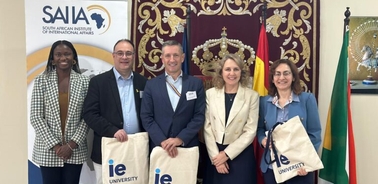2024 EU Parliamentary and US presidential elections: Geopolitical implications for EU–Africa partnerships

The IE School of Politics, Economics & Global Affairs Global Policy Center (GPC) and South African Institute of International Affairs (SAIIA) hosted a panel discussion at the Spanish Embassy in South Africa on October 9, 2024, bringing together key policymakers, diplomats, and researchers to explore the evolving dynamics of EU-Africa relations.
IE School of Politics, Economics & Global Affairs’ Global Policy Center (GPC) and the South African Institute of International Affairs (SAIIA) hosted a panel discussion at the Spanish Embassy in South Africa on October 9, 2024, bringing together key policymakers, diplomats and researchers to explore the evolving dynamics of EU–Africa relations.
The GPC is an academic think tank whose purpose is to extend research beyond the classroom by engaging with current and emerging trends. The GPC’s research and events are dedicated to posing thoughtful questions about ongoing political and economic shifts that consider the impacts and potential evolutions of these dynamics from a global perspective. Innovative ideas and policy solutions are the goal of these efforts.
The October 9 session, titled “Geopolitical EU and US elections: Impact on EU–Africa relations,” delved into the impact of the new EU Parliamentary makeup and the November 2024 US elections on the EU–Africa partnership amid shifting global geopolitics. With pressing issues like climate change, debt financing and the EU’s Global Gateway initiative on the agenda, this closed-door event fostered in-depth dialogue.
HE Raimundo Robredo, Ambassador of Spain to South Africa, inaugurated the event, and Steven Gruzd moderated a debate between Elizabeth Sidiropoulos, Dr. Philani Mthembu, and IE GPC Director Dr. Ilke Toygür.
In line with the GPC’s mission to utilize research in the service of policymaking, the discussions shed light on possible paths forward despite complex challenges. The debate tackled key questions around mutual priorities, regional challenges and practical steps to strengthen the critical EU–Africa relationship in an ever-changing world.
This debate is part of the GPC’s “Bridging the South(s)” research program, which examines the politics and economics of countries within this region through a holistic approach. The program considers both the shared experiences and unique dynamics that characterize nations spanning Africa, South America, Asia and the Middle East in all their geographical, political, economic, cultural and material diversity.
The ambition of the research program is to gain a more nuanced understanding of the perspectives and desires of Global South countries in order to situate efforts in the context of global partnerships, achieve greater representation in international institutions and ultimately enable more inclusive and equitable engagement. Themes of the research include the Global South’s political landscapes, economic trajectories and efforts toward sustainable growth, as well as international alignments and partnerships.
Given the importance of the EU and US elections in terms of general support for further intercontinental cooperation, continued investment in globalized versus localized initiatives and partisan stances on key questions like security and climate change, the outcomes of the elections open a range of uncertainties. The “Geopolitical EU and US elections: Impact on EU–Africa relations” debate sought to unpack these issues to dispel some of the uncertainty in favor of concrete understanding and ideas for management through policy and partnerships.